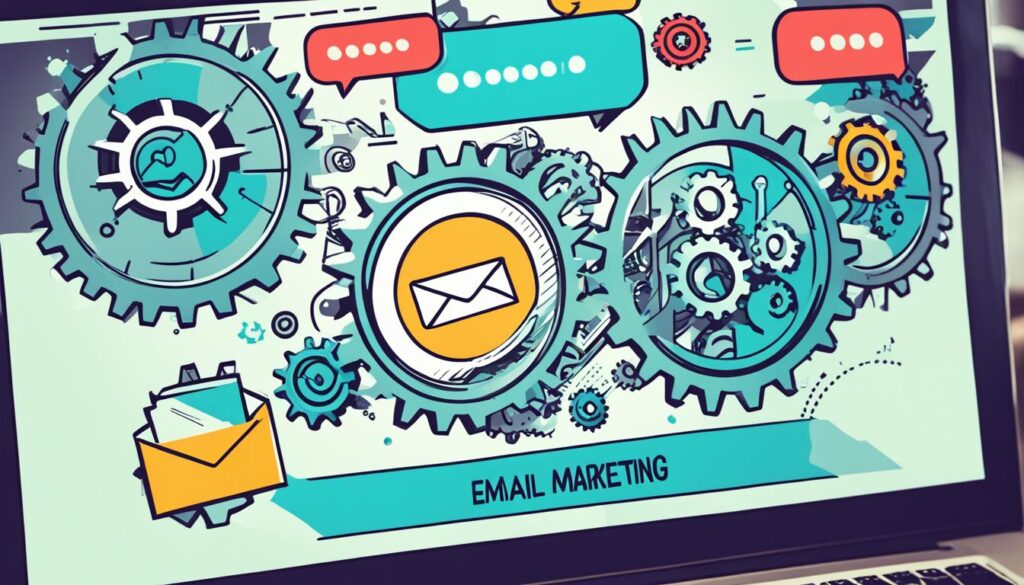In an era where efficiency and personalization are not just valued but expected, marketing automation emerges as a cornerstone for business growth. By merging technology with strategy, marketing automation tools like Marketo redefine how businesses interact with potential and existing customers. The seamless integration of comprehensive CRM systems and lead nurturing practices allows companies to cultivate relationships and optimize the customer journey, while data-driven email marketing campaigns yield unprecedented engagement.
Fueled by rich insights, marketing analytics go beyond mere number-crunching; they drive smarter, more informed marketing decisions. The meticulous orchestration of workflow automation liberates teams from repetitive tasks, empowering them to focus on what truly matters—innovation and strategy. Meanwhile, advanced techniques in customer segmentation and personalization are setting new standards, transforming prospects into loyal patrons through tailored experiences.
Key Takeaways
- The strategic implementation of marketing automation propels business growth and operational efficiency.
- Comprehensive CRM integration streamlines customer data, bolstering targeted engagement strategies.
- Lead nurturing, aided by automation, enhances conversion rates through personalized communication.
- Effective email marketing, powered by automation tools, can significantly increase customer interaction.
- Marketing analytics provide valuable feedback, driving ROI and intelligent marketing initiatives.
- Workflow automation relieves the burden of manual tasks, allowing teams to concentrate on creative endeavors.
- Personalization through precise customer segmentation solidifies the bond between brand and consumer.
The Role of Marketing Automation in Modern Business
Marketing automation is not merely a buzzword; it’s a pivotal force in the contemporary business landscape. By infusing efficiency into operations, these systems have revolutionized how companies engage with customers, fostering more meaningful connections while enhancing customer engagement. The integration of marketing automation into business practices allows for the streamlined execution of tasks and more strategic allocation of human capital.
Repetitive tasks, such as email marketing, social media postings, and even some aspects of customer service, can now be automated, leading to improved conversion rates. The value lies not just in carrying out these tasks but in doing so with a precision and consistency that reduces manual errors. By automating these processes, businesses are able to refocus efforts on more high-impact strategies like content creation and customer interaction.
According to recent market studies, companies that implement marketing automation experience a notable increase in leads and sales, proving the tangible benefits of this technological advancement.
Aside from boosting efficiency, marketing automation provides insights into customer behavior. Engagement tracking allows businesses to communicate more effectively, tailoring messages to the unique needs and interests of their clients. This data-driven approach propels a cycle of continuous improvement and personalization.
- Automation drives efficiency by completing routine tasks without human intervention.
- Improve engagement by utilizing customer data to personalize communications.
- Enhance conversion rates through targeted marketing campaigns driven by user behavior and analytics.
Implementing marketing automation tools has been a game-changer across various sectors, from retail to finance and beyond. Companies leveraging these systems find themselves well-positioned in a market where agility and responsiveness are key to staying ahead.
In a nutshell, the integration of marketing automation into the business ecosystem has enabled companies not only to survive but to thrive in an increasingly digital world. It is a cornerstone for scalable customer outreach and has become an indispensable tool for companies looking to bolster their market presence.
Integrating CRM for a Streamlined Marketing Automation Process
As the digital ecosystem continues to expand, the integration of Customer Relationship Management (CRM) systems with marketing automation is becoming increasingly crucial for businesses seeking to enhance customer experiences and drive sales. Utilizing CRM integration, companies can leverage centralized customer data to refine marketing strategies and develop personalized customer experiences that foster loyalty and improve return on investment.
Centralizing Customer Data
The unification of customer data across various touchpoints creates a centralized repository that is vital for personalized marketing and informed decision-making. Integration of CRM systems with marketing automation platforms ensures that every interaction, from social media engagements to sales calls, is meticulously recorded and easily accessible. This collective insight enables marketers to craft highly targeted campaigns that resonate deeply with consumers.

Enhancing Lead Management through CRM Integration
Lead management is significantly streamlined when marketing automation synergizes with CRM integration. Businesses gain the ability to nurture leads with a level of precision that was previously unattainable. By carefully studying and responding to lead behavior, companies can guide potential customers along the buying journey with greater efficiency, thereby boosting conversion rates and enhancing the customer lifecycle.
Tracking Customer Interactions and Behavior
With the advent of sophisticated behavioral tracking capabilities, marketing automation can now offer detailed insights into customer interactions. By examining patterns in customer preferences and engagements, CRM-integrated systems allow marketers to anticipate needs and predict future behaviors. These predictive analytics empower businesses to create more meaningful connections and implement timely interventions that can significantly influence purchasing decisions.
- Centralized customer profiles for cohesive marketing strategies
- Automated lead scoring and prioritization to accelerate sales cycles
- Real-time behavioral tracking to tailor customer communications
- Enhanced customer segmentation for precision targeting
Through meticulous CRM integration and marketing automation, businesses establish a powerful framework for managing customer data, leading to elevated marketing efforts and impressive sales outcomes. The ultimate goal is always to deliver exceptional customer experiences that not only meet but exceed expectations, fostering a cycle of continuous engagement and long-term brand loyalty.
Lead Nurturing Strategies Through Marketing Automation
Effective lead nurturing is crucial for moving prospects along the conversion funnel, and marketing automation is the powerhouse behind this process. With automation, businesses can ensure that their interactions with potential customers are consistent, timely, and, most importantly, meaningful. By aligning targeted content with the individual needs and behaviors of leads, companies are more likely to secure sales and foster customer loyalty.
The core of nurturing leads is understanding the journey of potential customers: from the first point of contact to the moment they’re ready to make a decision. Marketing automation enables brands to deliver personalized experiences at scale, ensuring that every lead receives attention that feels both individualized and relevant.
- Identifying Lead Behavior: Automation tools give insight into how leads interact with content, which helps in crafting more effective follow-up strategies.
- Automated Responses and Follow-ups: These tools can trigger communications based on specific lead activities or inactivity, keeping the dialogue open and the lead engaged.
- Personalized Content Delivery: By employing algorithms and data analysis, leads are presented with content that aligns with their interests and stage in the funnel.
- Progressive Profiling: Marketing automation platforms can gradually collect data about leads through various interactions, allowing for refined targeting over time.
As leads move closer to the point of purchase, the importance of targeted content becomes ever more significant. Each touchpoint is an opportunity to educate and influence the leads, easing any hesitation and paving the way toward a decision with as little friction as possible.
“In a digital world where attention is a currency, providing value through tailored content is the keystone of successful lead nurturing.”
Ultimately, the use of marketing automation in lead nurturing is a transformative strategy that can result in higher conversion rates and a more streamlined, effective sales cycle. It’s not just about selling more efficiently—it’s about connecting with customers in a way that respects their unique needs and positions your brand as the best solution to their challenges.
Email Marketing Optimization with Automation Tools
In the landscape of digital marketing, employing automation tools for email marketing is akin to powering your boat with a motor rather than manual paddling. These technological marvels fuel the creation and execution of targeted campaigns, while simultaneously simplifying scheduling and refining the process of sending follow-ups. Additionally, the utilization of marketing analytics plays an indispensable role in evaluating campaign success and driving strategic decisions.

Creating Targeted Email Campaigns
The cornerstone of effective email marketing is the ability to deliver tailored messages to a well-segmented audience. Marketing automation allows for the dissection of your email list into specific segments, thereby maximizing relevancy and engagement. Each campaign can be crafted to address the unique interests and behaviors of your segmented groups, resulting in enhanced response rates and customer loyalty.
Automating Email Scheduling and Follow-ups
Consistency and timing are key components in the success of email marketing. Automation tools are essential for organizing and scheduling campaigns so that they reach recipients at optimal times. Follow-ups, crucial for nurturing leads, can also be automated to ensure timely and efficient customer interactions without the need for constant manual input.
Measuring Email Marketing Success with Analytics
Digital marketers harness the capabilities of marketing analytics to track the performance of email campaigns. These insights allow for an in-depth understanding of open rates, click-through rates, and conversion statistics, thus influencing future email strategies. Marketing analytics provide a clear picture of return on investment and guide the iterative process of refining and optimizing email marketing tactics.
Leveraging Marketing Analytics to Drive Strategy
In the realm of modern marketing, the abundance of data available presents an extraordinary opportunity for businesses to refine their strategies and enhance overall performance. Marketing analytics represents the cornerstone of data-driven decision making, turning raw data into actionable insights. By carefully analyzing the customer journey, organizations can unveil a wealth of knowledge to influence their strategic moves.
Understanding Customer Journeys
Central to harnessing the power of marketing analytics is the ability to conduct customer journey tracking. This facet involves mapping out the various stages customers go through, from awareness to post-purchase behavior. Through this lens, companies can discern the motivations, pain points, and engagement patterns that define the customer experience, setting the stage for optimized marketing outreach.
ROI Analysis and Reporting
For a granular insight into marketing efficacy, ROI analysis emerges as a pivotal tool. Scrutinizing the return on investment for various campaigns allows businesses not only to justify marketing spend but also to redistribute budgets effectively based on performance. ROI reporting sheds light on the financial impact of marketing activities, guiding resource allocation to enhance profitability.
Using Data to Inform Decision Making
The culmination of diligent marketing analytics is the ability to make informed decisions rooted in empirical data. Whether it’s identifying the most lucrative marketing channels or tailoring campaigns to specific audience segments, data is the compass that guides marketing teams toward strategic excellence. In an ever-evolving market landscape, those who master data-driven decision making stand poised to outperform the competition.
Choosing the Right Automation Platform for Your Business
When it comes to automation platform selection, marketers must weigh several critical factors to find the best fit for their business needs. No two platforms are created equal, and what may serve one company perfectly could fall short for another. It’s essential to look for a platform that delivers not just in terms of functionality but also offers the scalability required to grow with your business.
In the realm of marketing automation, it is crucial to consider how a platform integrates with existing workflows and systems. The best automation platforms streamline processes and complement your business’s current operations, reducing the need for extensive training or overhaul of procedures.
Scalability should be at the forefront of your decision-making process. A platform that suits your company now but can’t scale with increased demand or complexity can become a costly hurdle in the future.
- Assess the ease of integration with current systems and software.
- Evaluate the user interface for ease of use and accessible features.
- Consider the level of customer support provided.
- Look for platforms with flexible pricing models that accommodate growth.
- Investigate whether the platform supports a wide range of marketing functions to avoid the need for multiple tools.
Different businesses will prioritize different features. For instance, a small startup might value ease of use and cost-effectiveness above all else, whereas a larger enterprise might require extensive customization abilities and robust analytics.
Making an informed automation platform selection is vital for effective marketing automation. Factors like business needs and future scalability should always guide your choice, laying the groundwork for unwavering marketing success as your business evolves.
The Power of Workflow Automation in Marketing
In the ever-evolving landscape of digital marketing, workflow automation has become a cornerstone for enhancing efficiency and scalability. Through the strategic application of task automation, companies are witnessing a transformative shift in their content marketing operations and social media management, allowing for unprecedented growth in productivity and engagement.
Efficiency in Content Marketing Operations
Content is king in the digital world, but managing its creation and distribution can be a queen-sized challenge. Workflow automation provides a regal solution, streamlining the entire content lifecycle from ideation to publishing. Automation tools serve to synchronize teams, organize editorial calendars, and ensure that each piece of content is crafted, approved, and released with precision timing.
- Scheduling blog posts and articles
- Automating content curation and distribution
- Tracking the performance of various content pieces
Streamlining Social Media Management
The dynamic realm of social media necessitates a proactive approach to maintain the brand’s presence and engage with the audience consistently. Automating key aspects of social media management allows brands to publish content across various platforms efficiently while maintaining a unified voice and brand narrative.
- Pre-scheduling posts and campaigns
- Auto-moderating comments and messages
- Gathering analytics for performance insights
Automating Routine Tasks to Focus on Strategy
By delegating repetitive tasks to automation software, marketing teams are empowered to redirect their focus towards creative and strategic pursuits. This shift from operational to strategic thinking is vital for innovation and long-term growth. Workflow automation liberates creatives and strategists to explore new horizons without being tethered to their desks by the chains of routine tasks.
“Embrace automation; let machines do the grunt work so that humans can soar to new heights of creativity and innovation.”
Segmenting and Targeting Customers with Automation
In the dynamic realm of digital marketing, the deployment of marketing automation serves as a linchpin for businesses aiming to carve out their niche in a crowded marketplace. With customer segmentation and personalized targeting at its core, automation platforms are redefining the trajectory of strategic marketing efforts. By harnessing the power of data and sophisticated algorithms, these platforms dissect extensive customer bases, transforming them into actionable, well-defined groups for more precise targeting.
Building Detailed Customer Profiles
The advent of technology in the realm of marketing automation has enabled the construction of intricate customer profiles with unparalleled ease and accuracy. Utilizing behavioral data, purchase histories, and demographic information, companies are now capable of crafting comprehensive representations of their customer’s personas. This intelligence is vital, as it equips marketers with the necessary insights to tailor communications and offerings that align seamlessly with each unique individual’s needs and preferences.
Customizing Messages for Different Audience Segments
Personalization is not just a buzzword but a strategic imperative in the age of information overload. As consumer attention becomes ever more fleeting, the importance of customized messaging for different audience segments has skyrocketed. Marketing automation excels here, allowing for the agile alteration of content that addresses the specific interests and concerns of each segment. Real-time personalization has burgeoned into a crucial component of customer experience, enhancing the probability of conversion through relevance and timely interaction.
Increasing Engagement Through Personalization
Finally, the role of personalization in marketing is not to be understated; it’s the engine that drives deeper engagement. The symbiosis between automation and personalization culminates in a user experience that feels both intuitive and individualized. Targeted messages based on customer profiles not only foster loyalty but also serve as a robust impetus for growth. Leveraging the profound capabilities of marketing automation, businesses position themselves to deliver resonant content at scale, ensuring every consumer engagement is both meaningful and memorable.



